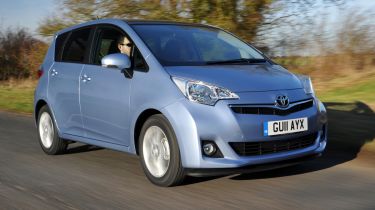Toyota Verso-S review
The all-new Toyota Verso-S has its sights set on the ever more crowded supermini MPV market.

For: Spacious interior, build quality, cabin storage
Against: Bland image, lack of versatility, numb controls
The all-new Toyota Verso-S has its sights set on the ever more crowded supermini MPV market. As a long awaited replacement for the Yaris Verso, the newcomer promises to mix practicality, compact dimensions and a hassle-free ownership experience. In an effort to keep things simple there are only tow trim levels and one engine.
Our choice: Toyota Verso-S TR
Styling
With its tall stance, steeply raked nose and upright tail the Toyota Verso-S looks every inch a supermini MPV. But while it’s modern and well proportioned, the newcomer looks a little bland when parked alongside bold rivals such as the Citroen C3 Picasso. Entry-level TR gets steel wheels, while alloy rims and full-length panoramic glass sunroof identify range-topping T-Spirit.
Interior
It’s obvious designers have taken a similarly low key approach with the Toyota’s cabin. The dashboard is attractively styled and neatly laid out, but there’s very little in the way of flair. And while the interior is solidly screwed together, the plastics aren’t up to the class standards. Not only do they look and feel cheap, the wide variety of finishes and textures is distracting. At least the panoramic roof of the T-Spirit models helps create and extremely bright and airy atmosphere.
Used - available now

2023 Audi
A3 Sportback
19,678 milesManualPetrol1.0L
Cash £17,324
2024 Audi
A3 Sportback
30,795 milesManualPetrol1.5L
Cash £19,750
2024 Audi
A3 Sportback
17,333 milesManualPetrol1.0L
Cash £18,811
2021 Mercedes
A-Class
41,806 milesAutomaticDiesel1.5L
Cash £16,051Driving and performance
At present there’s only one engine available with the Verso-S – the firm’s familiar 1.33-litre petrol. Mated to a six-speed manual gearbox – there’s an optional CVT Multidrive auto - the willing 98bhp unit delivers adequate performance, and the benchmark 0 to 62mph sprint takes 13.3 seconds. However, a lack of mid-range torque means you’ll have to work the powerplant hard to keep up with faster traffic. The steering is well weighted and direct, but the Toyota’s driving dynamics are otherwise below par. A lack of grip means the nose easily washes wide in corners, while the firm ride can become fidgety.
MPG and running costs
Given that the Verso-S is a petrol only model, it’s surprising to find it returns impressive claimed economy of 51.4mpg and CO2 emissions of 127g/km. Better still, the CVT equipped model boosts these figures to 54.3mpg and 120g/km respectively. However, we’d expect to see the newcomer equipped with the same fuel saving stop/start kit that features on the 1.33-litre engine when its fitted to the firm’s Urban Cruiser and Auris models. Toyota offers a range of fixed price servicing plans that help keep costs under control.
Practicality
You’d expect an MPV model to shine when it comes to practicality, but unfortunately the Verso-S is something of a mixed bag. There’s a decent amount of space for both driver and passenger, while the cabin is packed with useful cubbies, including a neat double glovebox. Better still, the load bay will swallow a generous 430-litres of luggage – which is larger than most family hatchbacks. However, the interior lacks the clever folding and sliding rear bench arrangement of rivals, while tailgate is a less flexible one-piece design.
Reliability and safety
The Verso-S has yet to be subjected to EuroNCAP’s strenuous crash tests, but there’s every chance it will but in a respectable performance. All versions feature the confidence inspiring inclusion of seven airbags, ESP and ABS. As with all Toyotas you can expect a trouble-free ownership experience. The Japanese firm’s dealers bagged a top four place in our 2010 Driver Power survey, plus all its cars are backed by an excellent five-year warranty.







